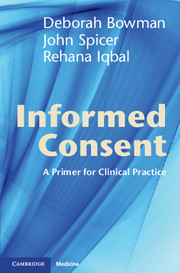Chapter 6 - Concluding thoughts on consent
Published online by Cambridge University Press: 05 January 2012
Summary
The opportunity to write is always an opportunity to learn. As a mixed authorial team, we have benefited from sharing our perspectives on, and experiences of, consent. This sort of productive and stimulating cross-disciplinary learning might have been anticipated. What was perhaps less predictable is the effect of revisiting, reviewing and reconsidering that most fundamental of concepts: consent. Readers will be reassured to know that the terrain was, we believed, familiar to and well trodden by us when we commenced this book.
We had reason to be confident: we knew the key cases, professional guidance and policy documents on consent thoroughly and we had spent many hours considering the conceptual ways in which the ethics literature has discussed autonomy, self-determination and the moral value of consent. The clinical enactment of consent in daily medical practice was also familiar, and we had views from both primary and secondary care in our team. Yet our confidence was tempered with wariness. The consequence of knowing the literature well and having a breadth of clinical experience was that we understood that there is a vast array of resources for those seeking guidance on consent. What was it that we could bring to the subject that was novel and informative?
- Type
- Chapter
- Information
- Informed ConsentA Primer for Clinical Practice, pp. 90 - 96Publisher: Cambridge University PressPrint publication year: 2011



